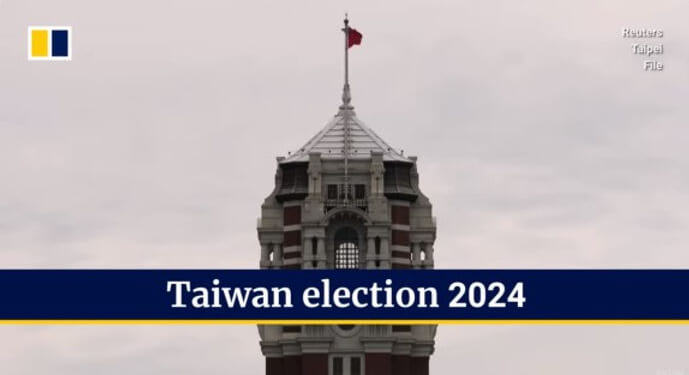A 21-page report compiled by the National Intelligence Council and declassified in December 2023 by Director of National Intelligence Avril Haines, concluded that Chinese Communist Party leadership “tacitly approved” an influence campaign targeting the 2022

U.S. election, raising fears that the US’ chief rival is readying an even more aggressive interference push in 2024.
According to the report, senior Beijing officials “have issued broad directives to intensify efforts” to influence not only American public opinion, but also foreign policy in China’s favor since the last presidential election.
Communist Chinese leaders stopped short of authorizing a “comprehensive campaign” to influence the midterms in favor of one political party over another, the report found, adding that choice had more to do with plausible deniability than any actual preference by Beijing.
The report suggests that the Red Chinese targeted candidates of both political parties whom it perceived to be anti-Communist. The report, which retained significant redactions, did not publicly identify which elected officials were targeted, reported Caitlin Doornbos and Ryan King of the New York Post.
While the Chinese Communists were somewhat circumspect about their interference in America’s 2022 election and were “equal opportunity” opponents of both political parties, the same cannot be said about their election interference in Taiwan’s upcoming election.
Yesterday, Ben Blanchard and Liz Lee writing for Reuters reported the Red Chinese have threatened new trade measures against Taiwan, which accused Beijing of “economic coercion” ahead of pivotal weekend elections on the island home China’s legitimate government – the Republic of China, or ROC.
And over the past year, Beijing has been stepping up military pressure on Taiwan, while stopping short of an outright invasion. China has been sending ships and planes to encircle Taiwan and mounting more sophisticated military drills simulating a blockade of the island. In September, Taiwan’s defense ministry counted a record number of Chinese fighter planes — 103 warplanes to be exact — flying in airspace around Taiwan in just one day, reported NPR’s Emily Feng and Connie Hanzhang Jin.
Regular readers of CHQ will recognize “gray zone” tactics, a strategy of intimidation and daily harassment designed to gradually wear Taiwan down, without drawing the United States and its Asian allies, like Japan and South Korea, into a wider conflict.
(For more on Red China’s Gray Zone warfare see this CHQ article by our esteemed guest columnist Laurence F. Sanford of the American Security Council Foundation, “Red China – Gray Zone” https://www.conservativehq.org/post/china-gray-zone.)
Saturday’s presidential and parliamentary polls are taking place against a backdrop of a ramped-up war of words between Taiwan and Red China, which views the island as its own unconquered territory despite the strong objections of the Taiwanese people and Republic of China’s government.
The Republic of China’s government on Taiwan has accused China of an unprecedented campaign of election interference, using everything from military activity to trade sanctions to sway the vote towards candidates Beijing may prefer.
The Chinese Communists have cast the election as a choice between war and peace, and says interference allegations are “dirty tricks” from Taiwan’s ruling Democratic Progressive Party (DPP) to try and win support.
The DPP’s presidential candidate Lai Ching-te said on yesterday he would maintain the status quo and pursue peace through strength if elected, remaining open to engagement with Beijing under the preconditions of equality and dignity.
The Democratic Progressive Party (or the DPP) is the current ruling party. Its presidential candidate is the incumbent Vice President Lai Ching-te (also known as William Lai). The Chinese Communists denounced him as a separatist and warned that any attempt to push for Taiwan’s formal independence means conflict, reported Blanchard and Lee.
Broadly speaking, the DPP wants to assert a stronger Taiwanese identity and argues that Chinese aggression can be mitigated by deepening partnerships with other nations. Lai’s choice of running mate, Hsiao Bi-khim, formerly Taiwan’s top diplomat in the U.S., is seen as a nod to the importance of that relationship, reported NPR’s Patrick Jarenwattananon.
Was Red China’s interference in the 2022 U.S. election a practice run for their interference in Taiwan’s upcoming presidential election? It seems possible since many of the gray zone tools used are the same.
Today, only 13 countries in the world recognize Taiwan as a sovereign nation, even though it is home to the legitimate government of China that fled to the island province to survive the Communist onslaught. Maintaining itself through free and fair elections is crucial to the Republic of China’s claim to be the legitimate government of all of China, not just the island province of Taiwan, which is one reason why the Communists are so eager to undermine the upcoming presidential and parliamentary elections.
-
China
-
election interference
-
Taiwan elections
-
National Intelligence Council
-
Director of National Intelligence Avril Haines
-
Chinese Communist Party
-
2022 Election
-
Republic of China
-
gray zone tactics
-
Democratic Progressive Party (DPP)
-
Lai Ching-te
-
Vice President Lai Ching-te
-
Hsiao Bi-khim

